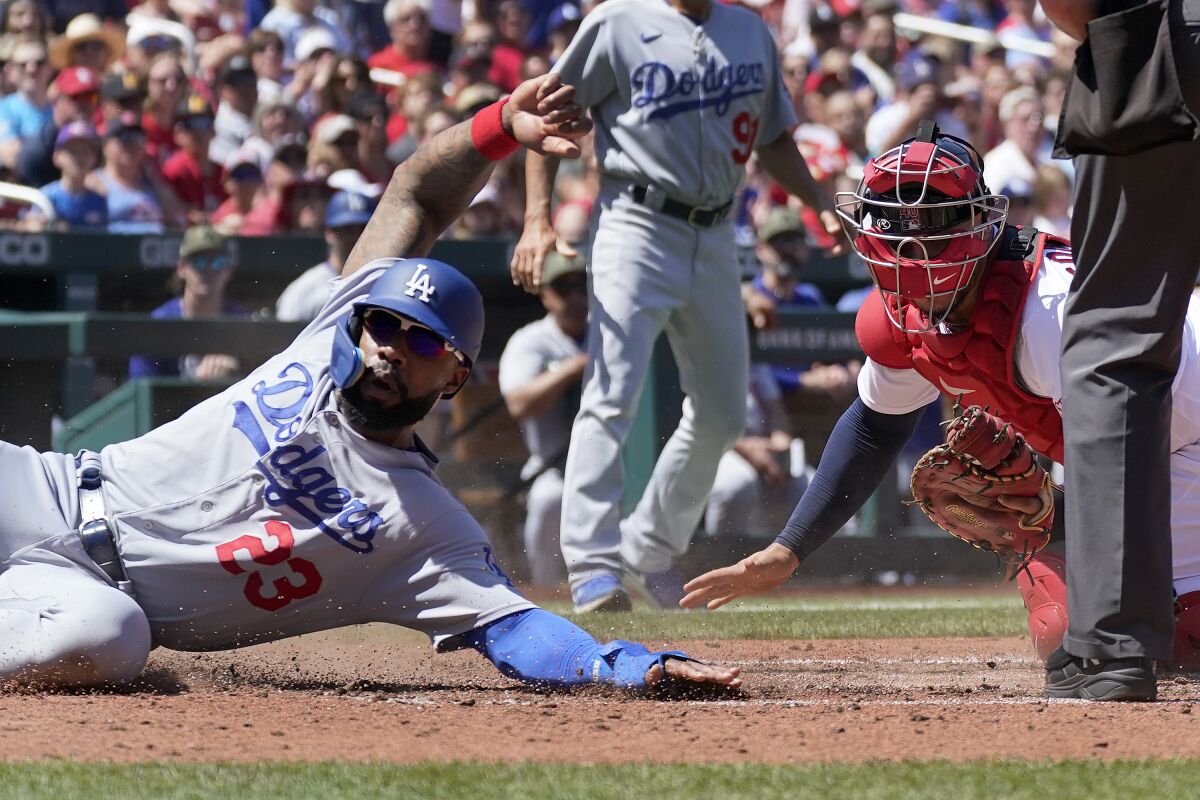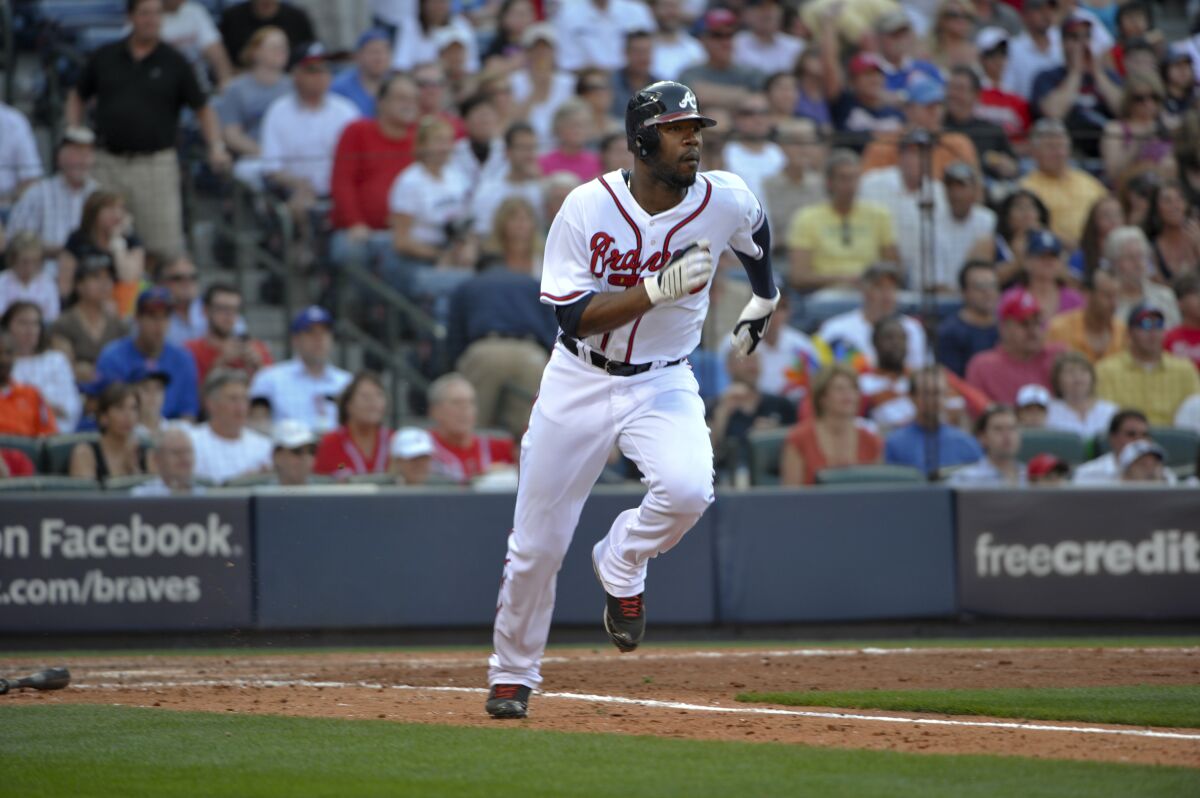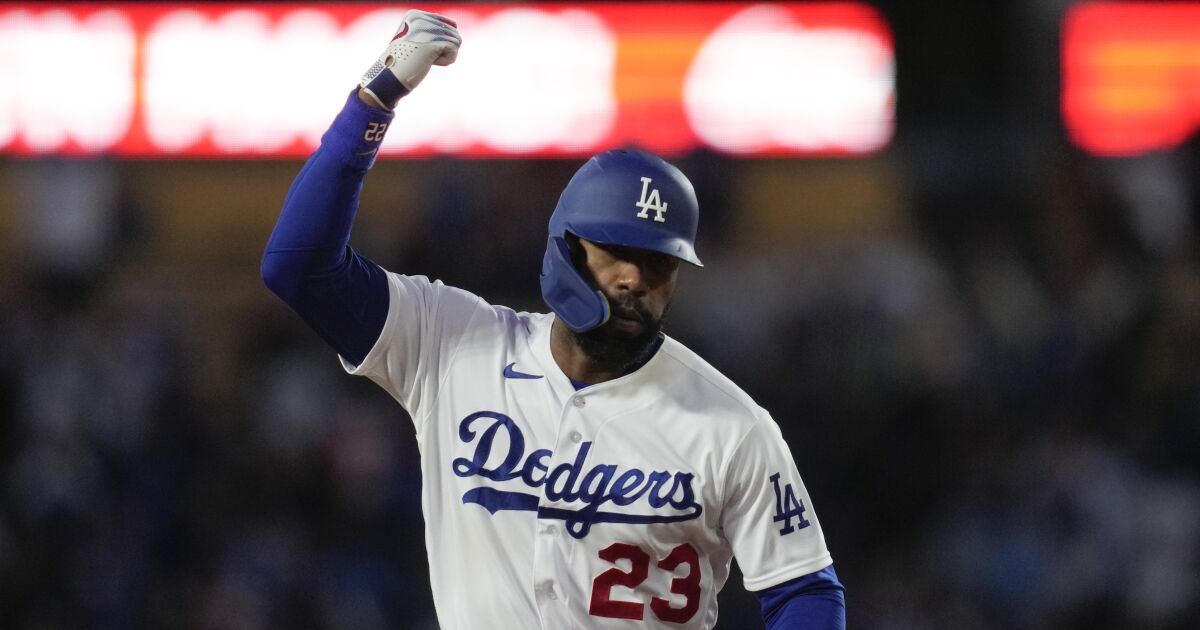Long before joining the Dodgers, family ties almost led Jason Heyward to UCLA
There are two Kenny Washingtons in the UCLA Athletic Hall of Fame.
The more famous one was a barrier-breaking, three-sport trailblazer. He was a baseball teammate of Jackie Robinson’s in the late 1930s, the first consensus All-American in the history of the football program, and in 1946, one of four Black players to re-integrate the National Football League.
The other left his own memorable Bruins legacy a few decades later.
In the 1960s, that Washington was a leading figure on the first two of John Wooden’s 10 national championship basketball teams. He had a legendary 26-point performance in the 1964 title game.
After a brief pro career, Washington returned to UCLA in the 1970s as the head coach of the women’s basketball team.
And, in 2005, he was inducted into the school’s sports Hall of Fame, honored during an on-campus ceremony attended by numerous other Bruins icons — and one precocious young member of his family.
Long before Jason Heyward was a first-round pick of the Atlanta Braves, an MLB All-Star and World Series champion, or a veteran outfielder now playing a key role for a first-place Dodgers team, he was a standout high school baseball player from Georgia, eager to follow his great uncle’s footsteps to the other side of the country.
Heyward’s father, Eugene, is Washington’s nephew. After spending his early childhood in South Carolina, Eugene lived with his uncle in Los Angeles as a teenager, finishing high school there before going off to play basketball at Dartmouth University (where he met Heyward’s mother, Laura).
Though Heyward’s parents eventually settled in Georgia, where he went to high school just south of Atlanta, Heyward would make occasional trips to L.A. with his dad growing up — most notably, for Washington’s Hall of Fame induction just before the start of Heyward’s junior baseball season.
Heyward, a tall, athletic outfielder, was already a highly-touted prospect by then, fielding interest from schools such as Clemson and Georgia Tech, but that 2005 trip moved UCLA to the top of his list.

Jason Heyward avoids being tagged out by St. Louis Cardinals catcher Willson Contreras as he slides into home during a game on May 21.
(Jeff Roberson / Associated Press)
And had it not been for the perfect set of professional circumstances — when his home state Braves drafted him 14th overall in 2007 — he might have been the next great UCLA alum within his family.
“It seemed like a good environment,” Heyward said. “A good atmosphere to grow into.”
As he returned to Atlanta this week, where the Dodgers took two of three games from the Braves, Heyward reflected on those early days, recalling the process that nearly led the Georgia native to enroll at UCLA.
A year after his great uncle’s Hall of Fame induction, Heyward returned to campus for an official visit.
He was impressed by coach John Savage, who was just beginning a decorated tenure now in its 19th season. He bonded with his host, Brandon Crawford, a then-freshman on that Bruins team now playing his 13th MLB season with the San Francisco Giants. He even was struck by the atmosphere of the Rose Bowl, after going to watch one of UCLA’s football games.
“Getting out there, meeting coach Savage, taking a tour, seeing the campus, it was obviously beautiful,” Heyward said.
So, at the start of his senior year of high school, he gave the Bruins his college commitment.
The more Heyward impressed MLB scouts leading up to the draft, however, the more complicated his decision became.
There were several franchises with early picks that expressed interest in Heyward, from the Kansas City Royals at No. 2 to the Florida Marlins at No. 12. But Heyward also knew there was a chance he could slip down the draft board, keeping his UCLA pledge in his back pocket just in case.
The one destination that made perfect sense was the Braves, who were lingering at pick No. 14.
“If this happens,” Heyward told himself, “I don’t think there’s any reason to go to school.”

Atlanta Braves rookie Jason Heyward during the team’s opening day game against the Chicago Cubs at Turner Field in Atlanta on April 5, 2010.
(Rich Addicks / Associated Press)
Lo and behold, his final choice was easy. The Braves selected Heyward and signed him to a $1.7-million contract. Despite his attachment to UCLA, he gave up his college eligibility while still only 17.
“It wasn’t like I needed to weigh a whole lot,” Heyward remembered.
Even Savage, who detailed the process in a 2010 interview, couldn’t help but agree.
“He would have been a nice little player, no doubt,” the coach said then, leading up to Heyward’s debut MLB season. But, Savage added, “That’s one example of a guy that made the right decision.”
The rest has been history.
Heyward finished second in Rookie of the Year voting while earning All-Star honors in 2010, and blossomed as a Gold Glove right fielder on perennially postseason-bound Braves teams.
In 2016, he not only won a World Series with the Chicago Cubs but delivered a famous Game 7 speech that helped end that club’s 108-year title drought.
This year, after coming to the Dodgers on a minor league deal in the offseason, the 33-year-old has revitalized his game again, batting .228 with five home runs, 11 RBIs and an above league-average .807 on-base-plus-slugging percentage.
It’s finally the L.A. baseball moment he once dreamed of; only, it’s coming 16 years after his plans to follow familial ties to UCLA took a different path.
Asked this week what might have happened if the Braves passed on him in the draft, and he landed with another, less-fitting team, Heyward contemplated the weighty what-if, thinking back to the days he seemed destined to become a Bruin.
“I don’t know,” he said. “It would have been tough to turn down the first round at that time. There was a lot of hard work coming up. Playing high school games against guys from Florida, California, you see a lot of really good ball players. And you don’t know if you’re gonna get this chance again.”
But, he added, at least some blue and gold still pumping through his heart, “it seemed like a cool opportunity.”
For all the latest Sports News Click Here
For the latest news and updates, follow us on Google News.

